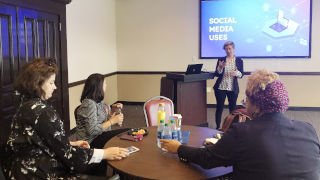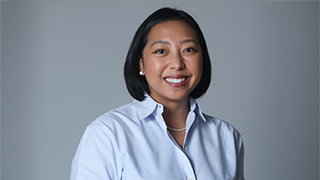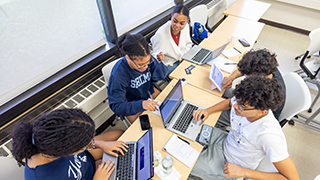CommArts' Grad Studies Hosts Social Media Faculty Workshop - Seton Hall University
Saturday, November 23, 2019

Tsuria initiated the afternoon's session with a presentation on the importance of social media in the classroom, especially when speaking with "Gen-Z students" since social media and its components are "the tools that make sense to our students." Tsuria's presentation was then followed by speaker Apryl Williams, Ph.D., an Assistant Professor of Sociology at Susquehanna University, Pennsylvania and fellow at the Berkman Klein Center for Internet and Society at Harvard University. Williams began by presenting her ongoing research work on race in social media which uncovers algorithmic racial biases in online dating and the personal biases that people who use online dating applications experience. The discussion then turned to her in-class integration of sociology-focused digital media research projects. Using a digital identities project, Williams gives each student the opportunity to experience the world-view of an alternate identity persona. What Williams truly hopes each student walks away with, is a real-world awareness of the way race and identity are communicated in the world around us.
The next speaker, current Assistant Professor of Art and Design for the College, Christine Lhowe, M.F.A., is a visual designer whose scholarship focuses on design as an agent of inclusion and positive social change. Lhowe spoke about her professional efforts as 'an advocate for advocacies'. In her work with Success Academy Charter School, Lhowe shared how she used social media as a platform for connecting people, building communities and in turn, discovering the power of online engagement. Lhowe admitted that integrating social media in the classroom is not a simple task but yields lasting results. Lhowe explained how she incorporates Pinterest as a way for students to share design inspiration and facilitate a guided discussion. Lhowe noted that when using social media, "We are curators, co-creating the space and the conversation."
Following Lhowe's discussion, Aya Yadlin Segal, Ph.D., Lecturer for the Department of Politics and Communication, at Hadassah Academic College, in Israel, presented an overview of her work. Yadlin-Segal discussed her research on social media framing in a political context, journalism and the online discourse on disabilities. Given that Yadlin-Segal's research is primarily focused on social media, her class syllabi and tools employ social media-focused tactics. She suggests that using social media in the classroom is a must and explains, "Everything we do is related to the internet in different ways." One of the strategies she uses most often is creating internet memes as part of in-class activities. "Memes are part of the regular language students use to engage with others in daily life," Yadlin-Segal continued. "Students are also participants in academic culture [and we should] use tools like memes to communicate to students in the classroom."
The second part of the workshop's program consisted of a roundtable discussion where faculty in attendance were given opportunity to ask questions. During the discussion, the speakers noted that by using social media as an educational tool, the ethical aspect may not always be clear and there is a responsibility as educators to steer the conversation when needed. The speakers then added that using social media has its challenges however, it is easy and fun for students to use and is a relatable way for faculty to utilize tools that students are familiar with in their daily lives. The session ended with insight and advice from the speakers who noted the importance of remaining open-minded when dealing with the nuances of using social media in the classroom.
In addition to the University's faculty community, the workshop was open to graduate students. Tsuria, who spearheaded the event, saw the interest of graduate students in pursuing academic careers. Being that the focus of the workshop was on the work and experience of communication research-educators, she invited students conducting research on social media to attend and observe other communication researchers.
"While the workshop is focused on communication and art research views, the main takeaway from the workshop is, hopefully, that all educators should be able to take social media and integrate it into their regular classroom agenda," Tsuria said. "Through events like this one, I hope to continue the conversation of our College becoming the digital communication and media hub of the University."
The College currently offers three Master's-level programs, including Museum Professions, Communication, and Public Relations. In addition, four dual-degree options, including three accelerated B.A./M.A. programs and a dual M.A. degree with the School of Diplomacy and International Relations are offered.
For more information about Graduate Studies within the College of Communication and the Arts, please contact Dr. Ryan Hudes.






